Local
Exclusive: Md. marriage campaign raises $3.2 million
Marylanders for Marriage Equality will submit financial report to state election officials late on Friday
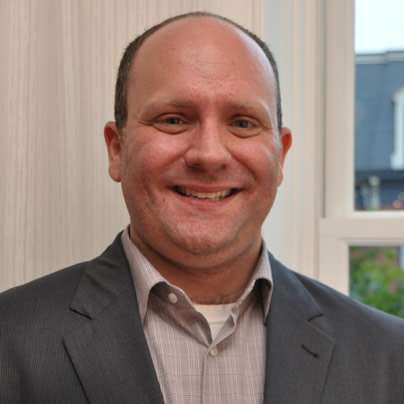
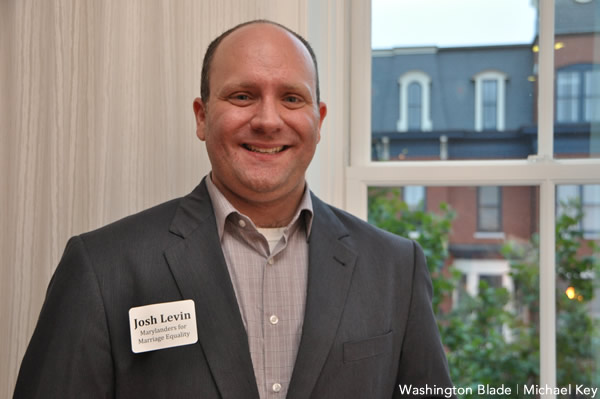
Marylanders for Marriage Equality campaign director Josh Levin (Washington Blade photo by Michael Key)
The group defending Maryland’s same-sex marriage law will report later on Friday that it has raised $3.2 million.
Marylanders for Marriage Equality’s campaign finance report that it will file with state officials will also note total expenditures of slightly more than $2 million, with roughly $1.2 million cash on-hand. It will indicate just short of $400,000 of in-kind donations from the Human Rights Campaign and other organizations.
The report will also include more than 950 pages of donors and contributions.
“We truly appreciate the generous support of all those who believe in fairness and equality – particularly the thousands of grassroots supporters all over the state,” Josh Levin, campaign manager of Marylanders for Equality, told the Washington Blade.
Marylanders for Marriage Equality has held a number of high-profile fundraisers with Gov. Martin O’Malley, gay former Republican National Committee Chair Ken Mehlman, Ravens linebacker Brendan Ayanbadejo and others over the last several months. Former National Football League Commissioner Paul Tagliabue and his wife Chan announced a $100,000 donation to the campaign during an Oct. 2 fundraiser at gay Democratic lobbyist Steve Elmendorf’s Logan Circle home that O’Malley; D.C. Mayor Vincent Gray; Chip DiPaula, former Maryland Gov. Robert Ehrlich, Jr.,’s chief-of-staff and others attended.
New York City Mayor Michael Bloomberg, who attended Johns Hopkins University in Baltimore, announced earlier on Friday that he had donated $250,000 to Marylanders for Marriage Equality. This donation will be the largest single contribution listed on the campaign’s report.
It will further note $1.6 million in media buys on local television stations through Nov. 6 — the first Marylanders for Marriage Equality ads that feature Rev. Donté Hickman of Southern Baptist Church in Baltimore and Rev. Delman Coates of Mount Ennon Baptist Church in Clinton in Prince George’s County aired on WBAL in Baltimore on Tuesday. The first ad from the Maryland Marriage Alliance, the group opposing Question 6, began running on the same television on Monday — they have also begun to air on News 4 in D.C.
Levin told the Blade in June he was confident that he could run what he described as a “winning campaign” with between $5 and $7 million. O’Malley told LGBT journalists and bloggers on a Sept. 24 teleconference call that the campaign needed to raise another $2 million ahead of the Nov. 6 referendum.
“I would say we are far along to our goal,” he said in response to the Blade’s question about specific fundraising figures during the briefing. “We are beyond the 50-yard line and we continue to move forward, not back.”
O’Malley said during the Oct. 2 fundraiser in D.C. that Marylanders for Marriage Equality needed to raise another $1 million before Election Day.
Marylanders for Marriage Equality will file its campaign finance report on the same day HRC gave the group an additional $150,000 and another $150,000 to the National Association for the Advancement of Colored People’s Maryland Marriage PAC. HRC has given Marylanders for Marriage Equality $652,000 from July 11 through Oct. 7.
The report will also show $50,000 in in-kind donations from the ACLU of Maryland.
“We’ve always said this is a $5 million- plus campaign and hope to meet that goal as we enter the final stretch,” said Levin.
The Maryland Marriage Alliance notes in its own campaign finance report that it has raised $838,620.74. The anti-Question 6 group further reported $510,513.63 in expenditures and a cash balance of $328,107.11.
The National Organization for Marriage gave $400,000 to the Maryland Marriage Alliance. The Connecticut-based Knights of Columbus contributed $250,000 to the anti-Question 6 campaign.
District of Columbia
Reenactment of first gay rights picket at White House set for April 17
Event marks 59th anniversary of historic push for gay rights in nation’s capital
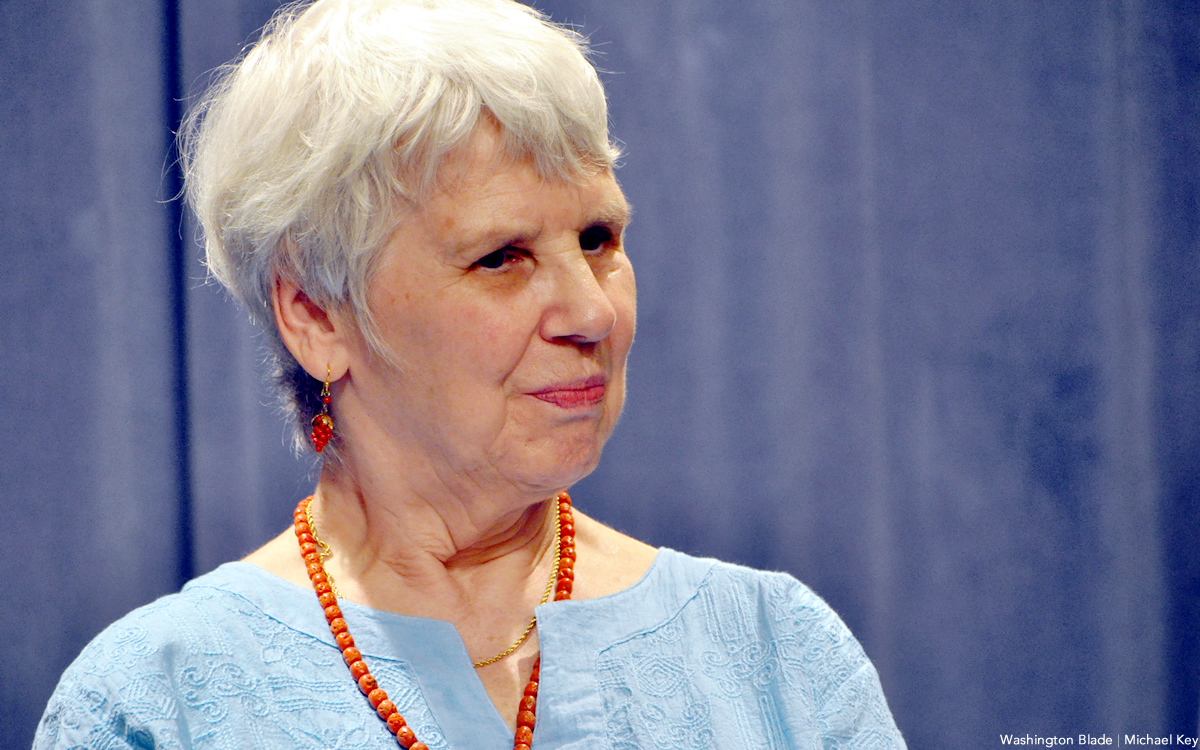
D.C.’s Rainbow History Project announced it will hold a reenactment on Wednesday, April 17, of the historic first protest for gay rights in the form of a picket line in front of the White House that took place on that same day in 1965.
In a statement released last week, Rainbow History Project says the reenactment will mark the 59th anniversary of an event that is credited with bringing attention for the first time to the federal government’s longstanding discrimination against a minority group referred to then as homosexuals or gays and lesbians.
The statement notes that the 1965 event was organized by the Mattachine Society of Washington, D.C., the first politically active LGBT organization in the nation’s capital founded by local gay rights pioneer Frank Kameny.
“The picket took place on the White House sidewalk, Lafayette Park, 1600 Pennsylvania Ave., on April 17, 1965,” the statement says. “For exactly one hour, from 4:20 p.m. to 5:20 p.m., members of the Mattachine Society of Washington walked in a circle, non-stop, in silence, carrying posters of their demands,” the statement continues.
“The White House picket is the origin story for public demonstrations for gay rights in the U.S., and the origin story for Pride Marches and the annual LGBTQ Pride celebrations which occur across the globe,” according to the statement.
It says those picketing in the April 1965 event, which included Kameny and longtime local D.C.-area lesbian activist Lilli Vincenz, both of whom held doctorate degrees, called on the government to adopt the Mattachine Society of Washington’s four major demands: an end to the exclusion of homosexuals from federal government employment; an end to the ban on gays and lesbians from serving in the U.S. military; an end to the “blanket denial” of security clearances for gay people; and an end to the “government refusal to meet with the LGBTQ community.’
Among those who chose not to respond to the request for a meeting was President Lyndon B. Johnson, who occupied the White House at the time of the 1965 picketing.
Vincent Slatt, the Rainbow History Project’s director of archiving and one of the lead organizers of the April 17 reenactment event, said the event is aimed, among other things, at drawing attention to how far the LGBTQ community has come since 1965. He said the event is not in any way a protest of the administration of President Joe Biden and Vice President Kamala Harris, who Slatt called staunch supporters of the LGBTQ community.
“We are just reenacting this historical event and pointing out how far we’ve come,” Slatt told the Washington Blade. “If you think about what it means in 1965 when these people were protesting and LBJ would not even respond to them. And now, we are at a place where Vice President Harris speaks on a stage at Capital Pride.”
The Rainbow History Project statement notes that the reenactment event will also be held in honor of Kameny, who died in 2011, and Vincenz, who passed away in 2023, both of whom participated in a similar reenactment event in 2008.
Among those who will be participating in this week’s reenactment on April 17 will be longtime local LGBTQ rights activist Paul Kuntzler, who is the only known surviving person who was among the White House picketers at the April 1965 event. Kuntzler will be carrying a replica of his own picket sign he held at the 1965 event, the statement says.
It says Rainbow History Project volunteers will also carry replicas of the original protest signs and hand out literature explaining the picket to passersby and tourists.
Similar to the 1965 event, the reenactment picketing at the White House will begin on April 17 at about 4:15 p.m., according to Slatt of the Rainbow History Project.
District of Columbia
Four LGBTQ candidates running for delegate to Democratic National Convention from D.C.
Thirty-two candidates competing for 13 elected delegate positions in April 20 party caucus
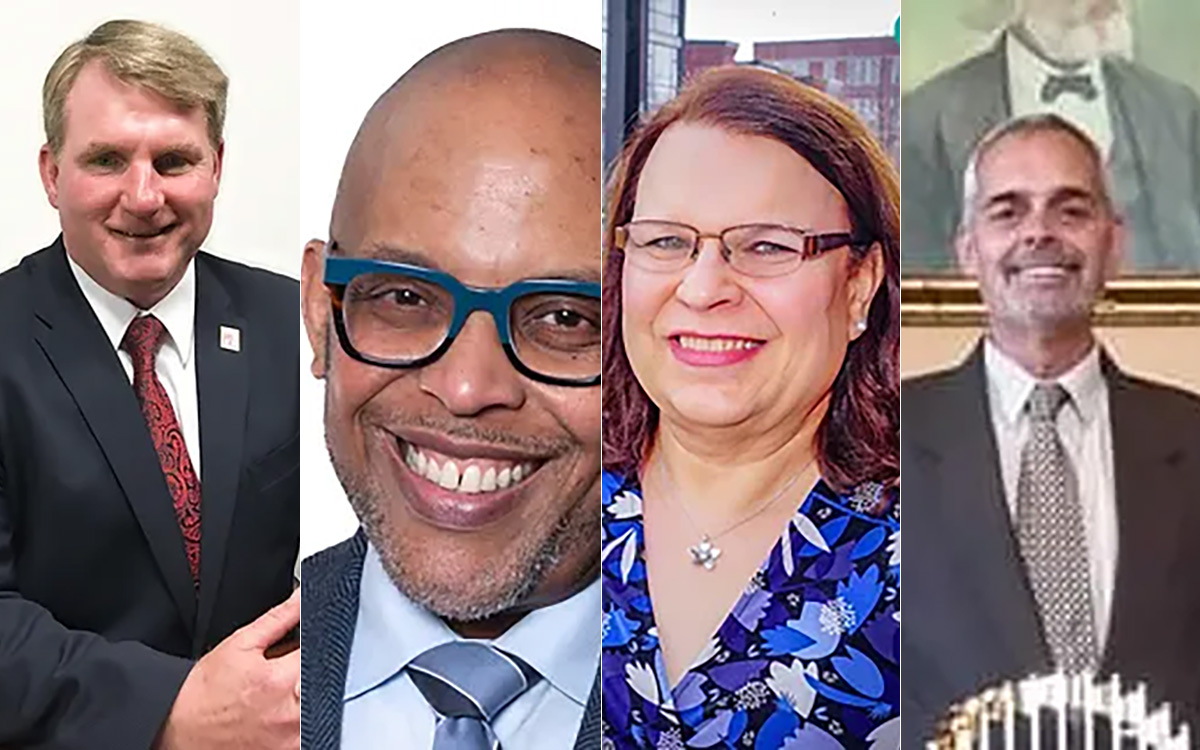
Four LGBTQ Democratic Party activists are running for election as delegates from D.C. to the Democratic National Convention at an April 20 local Democratic Party caucus election in which all D.C. voters who are registered as Democrats will be eligible to vote.
The four LGBTQ candidates are among 32 candidates competing for just 13 elected delegate positions. D.C. will have a total of 51 delegates to the Democratic Convention, but the other 38 include elected officials and party leaders who are considered “automatic” or appointed delegates. The convention will be held in Chicago Aug. 19-23,
Under the delegate selection process put in place by the D.C. Democratic Party, six of the thirteen elected delegate positions will be elected by voters in a section of the city designated as District 1, which includes Wards 1,2, 6, and 8. The other seven elected delegates will be chosen by voters in District 2, which includes Wards 3, 4, 5, and 7.
The LGBTQ candidates include longtime gay Democratic activists David Meadows of Ward 6 and John Fanning of Ward 2 who are running in District 1. Transgender rights advocate and Democratic Party activist Monika Nemeth of Ward 3 and gay Democratic activist Jimmie Williams of Ward 7 are running in District 2.
All four of the LGBTQ candidates have been active members of the Capital Stonewall Democrats, one of D.C.’s largest LGBTQ political organizations. Nemeth and Meadows are past presidents of the organization. Williams has served as chair of the Ward 7 Democratic Committee and is a current member of the committee. Fanning has served as an elected member of the D.C. Democratic State Committee from Ward 2 and served as a delegate to the 2016 Democratic National Convention.
A total of 12 candidates are running in each of the two districts. Under party rules the highest six vote getters in District 1 and the highest 7 vote getters in District 2 will be declared the winners.
The Saturday, April 20 caucus election for the delegate candidates will take place at the Walter E. Washington D.C. Convention Center. An announcement by party officials says two voting sessions will take place, one from 10:00 a.m. to 2:00 p.m. and the other from 4:00 p.m. to 8:00 p.m.
Aside from the elected delegates, two prominent D.C. LGBTQ Democratic leaders will be appointed as delegates to the 2024 Democratic National Convention in their role as members of the Democratic National Committee from D.C.
They are Claire Lucas, a highly acclaimed Democratic Party and LGBTQ rights advocate and party fundraiser; and Earl Fowlkes, one of the lead organizers of D.C.’s annual Black LGBTQ Pride celebration and former president of Capital Stonewall Democrats.
Lucas and Fowlkes and the four LGBTQ candidates running in the April 20 caucus election are committed to backing President Joe Biden as the Democratic nominee for re-election.
Statements from each of the candidates running for delegate in the April 20 caucus election, including the four LGBTQ candidates, can be accessed here: Candidates for Delegate | DC Democratic Party
District of Columbia
HIPS D.C. launches ‘Harm Reduction’ vending machine program
LGBTQ supportive group says program aimed at ‘saving lives’ in response to overdose crisis
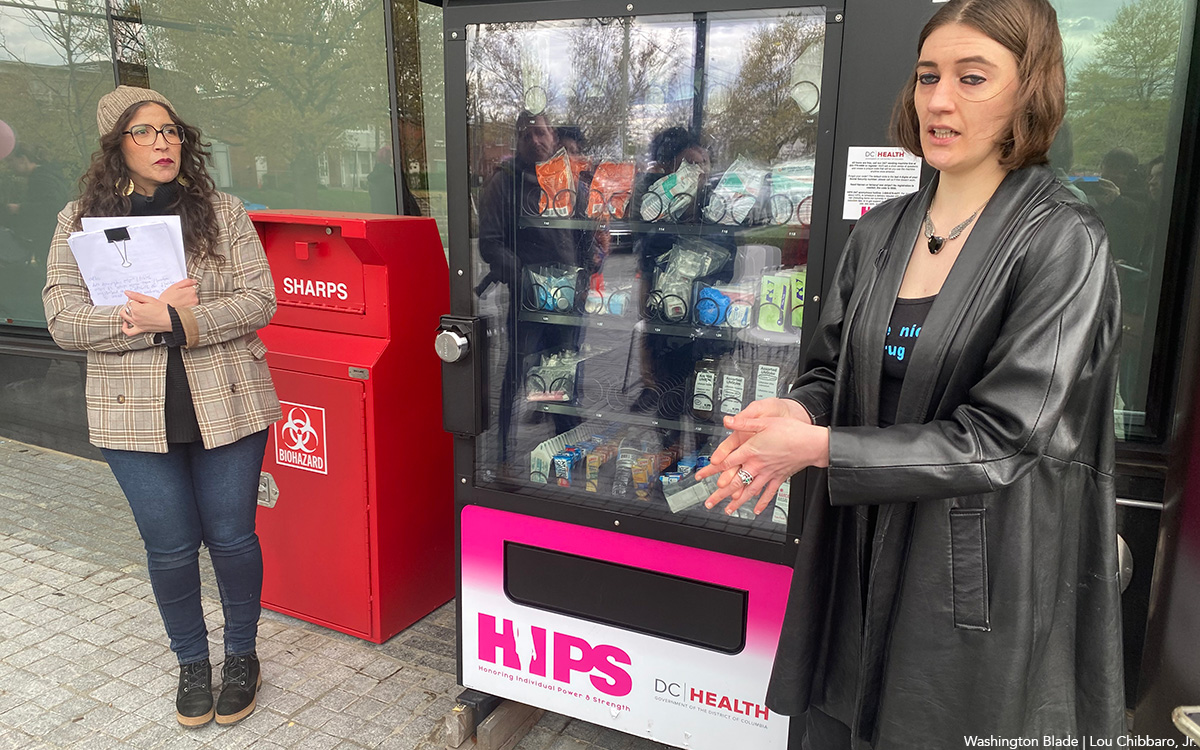
HIPS D.C., the LGBTQ supportive organization that provides support and services for drug users and sex workers, officially launched on April 5 a ‘Harm Reduction Vending Machine Pilot Program’ that it says will help save lives by providing free of charge harm reduction supplies for drug users in locations where there is a “higher than average” rate of overdose cases.
The announcement of the project was held outside the Whitman-Walker Health Max Robinson Center building at 1201 Sycamore Dr., S.E., next to where one of the first three HIPS vending machines is located.
Alexandra Bradley, HIPS’ Outreach and Community Engagement Manager, told a small gathering at the announcement event that among the supplies provided free of charge through the vending machines are naloxone, the life-saving nasal spray medication used to treat an opioid drug overdose; fentanyl test kits, syringes, and syringe wound care kits; drug snort kits, condoms, and other items, including water bottles and snack food such as crackers and granola bars.
Bradley and other officials with HIPS and Whitman-Walker Health said they believe most people, when informed of the rationale behind the vending machines and other programs supporting drug users, will understand that the programs are not encouraging drug use.
“People will use drugs,” Bradley said. “We want them to use them safely,” she added, with the hope that they will seek support to get off drugs. “We can’t help anybody if they are dead. We want to keep people safe,” Bradley said.
A statement released by HIPS says the vending machine pilot program is being funded by a grant from the D.C. Department of Health. It says anyone can access the machines free of charge by contacting HIPS through a phone number posted on the machines – 202-779-0486 – to obtain a four-digit participant code “that they will then punch in to use the machines.” It says that as of April 5, 150 individuals had already registered and enrolled in the program.
Bradley pointed out that registration is not required to obtain naloxone supplies, which can be obtained through a code number posted on the machines. She said each of the three machines are also accompanied by a metal disposal receptacle for safely placing used syringes.
“These machines have been placed in areas where there are higher concentrations of overdose deaths and/or underserved areas with high levels of need for access to services and supplies,” the HIPS statement says.
In addition to the HIPS vending machine at the site of Whitman-Walker’s Max Robinson Center, the second HIPS vending machine is located at The Michelle Obama Southeast Center of Bread for the City at 1700 Marion Barry Avenue, S.E., and the third one is located at Bread for the City’s Shaw neighborhood facility at 1525 7th Street, N.W.
The announcement of the vending machine harm reduction project comes at a time when many in the D.C. LGBTQ community have mourned the loss of beloved local LGBTQ members from a drug overdose, including accidental drug overdoses caused by contamination of their preferred drug such as cocaine with fentanyl.
Also speaking at the announcement event was Andrea Lopez, an Associate Professor at the University of Maryland’s Department of Anthropology, which she said is partnering with HIPS to conduct a study of the vending machine pilot program and its impact as a public health project and the public health benefits of vending machines as an “intervention” in support of those in need.
Others who spoke at the event and provided details of the vending machine project were Cyndee Clay, the HIPS Executive Director; Starr O’Leary, the HIPS Community Outreach Coordinator; and Jona Tanguay, an official with Whitman-Walker Health.
-

 LGBTQ Non-Profit Organizations5 days ago
LGBTQ Non-Profit Organizations5 days agoDay of [no] silence, a call to speak out against anti-LGBTQ+ hate
-

 Africa1 day ago
Africa1 day agoCongolese lawmaker introduces anti-homosexuality bill
-

 Colorado3 days ago
Colorado3 days agoFive transgender, nonbinary ICE detainees allege mistreatment at Colo. detention center
-
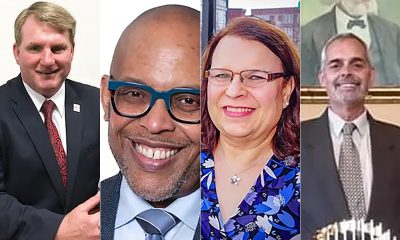
 District of Columbia5 days ago
District of Columbia5 days agoFour LGBTQ candidates running for delegate to Democratic National Convention from D.C.












